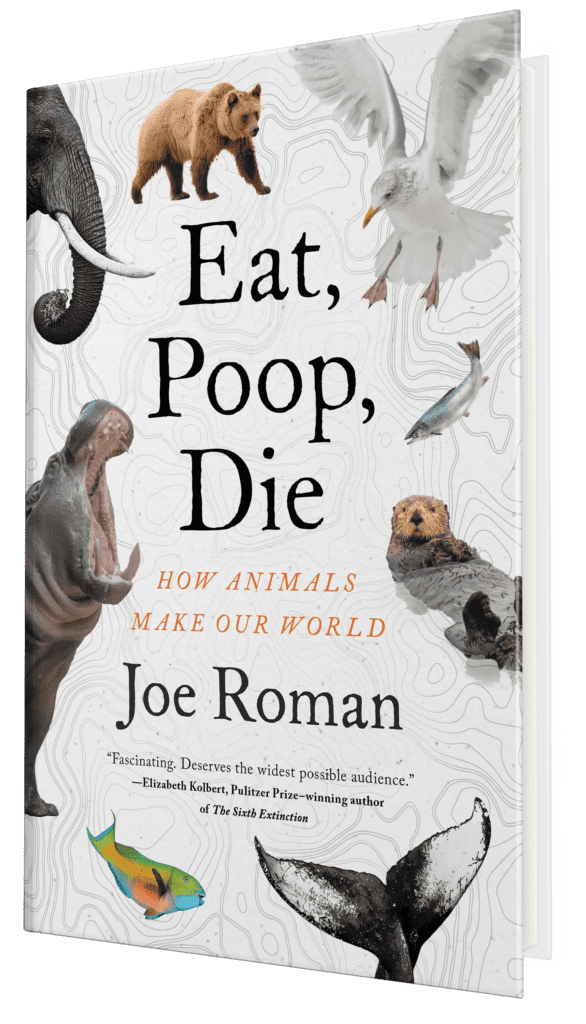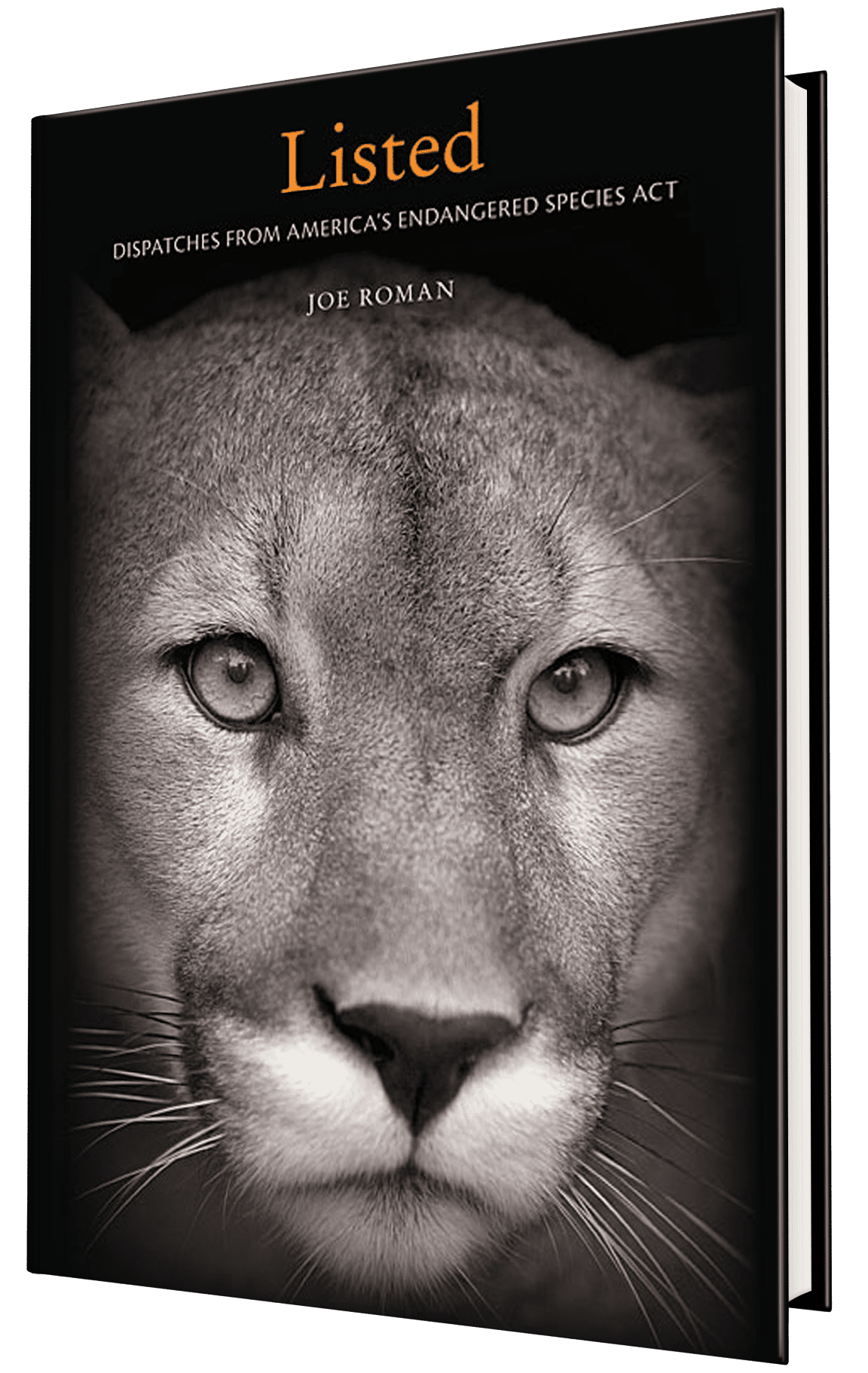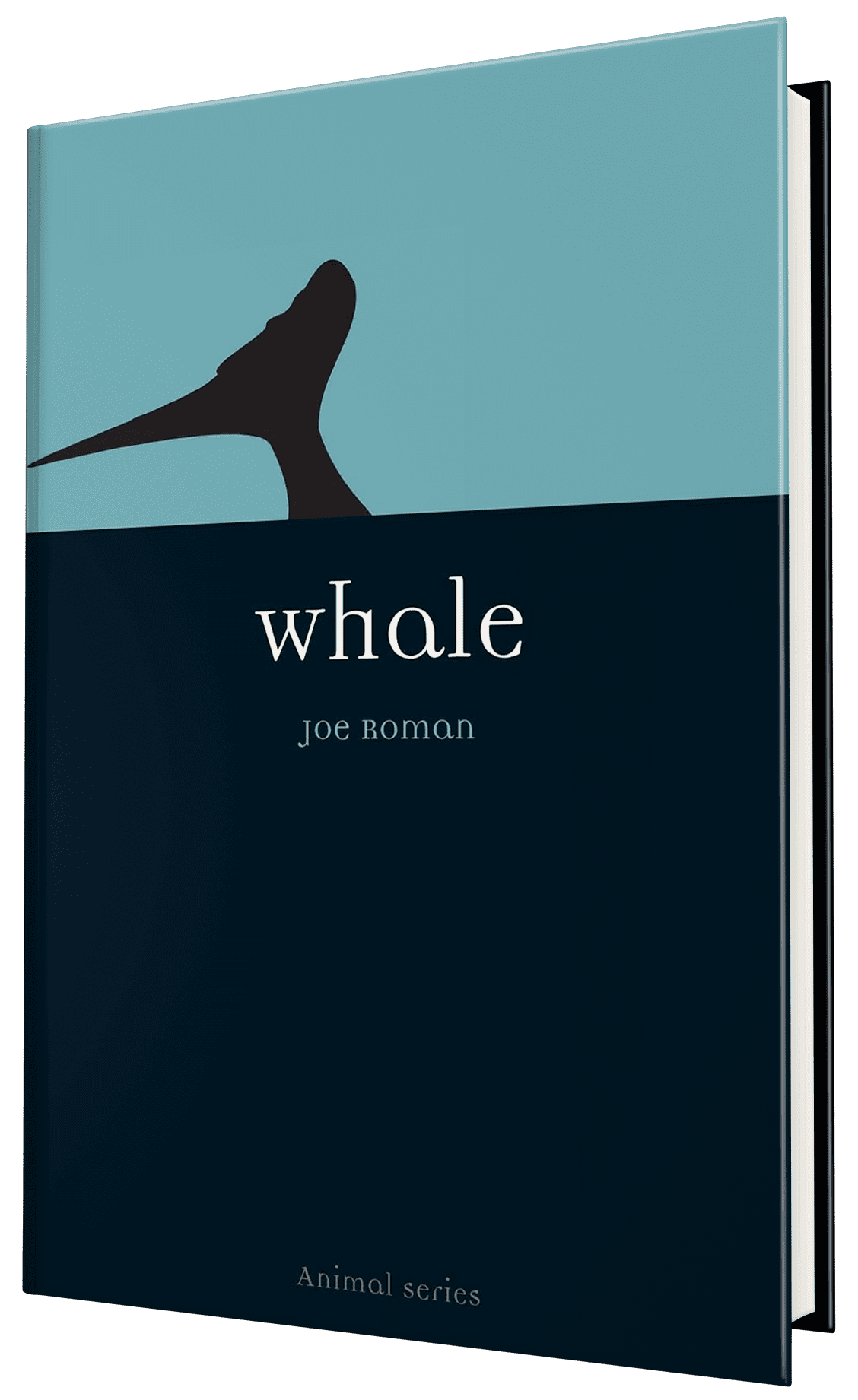BOOKS
EAT, POOP, DIE
If forests are the lungs of the planet, then animals migrating across oceans, streams, and mountains—eating, pooping, and dying along the way—are its heart and arteries, pumping nitrogen and phosphorus from deep-sea gorges up to mountain peaks, from the Arctic to the Caribbean. Without this conveyor belt of crucial, life-sustaining nutrients, the world would look very different.
The dynamics that shape our physical world—atmospheric chemistry, geothermal forces, plate tectonics, and erosion through wind and rain—have been explored for decades. But the effects on local ecosystems of less glamorous forces—rotting carcasses and deposited feces—as well as their impact on the global climate cycle, have been largely overlooked. The simple truth is that pooping and peeing are daily rituals for almost all animals, the ellipses of ecology that flow through life. We eat, we poop, and we die.
From the volcanoes of Iceland to the tropical waters of Hawaii, the great plains of the American heartland, and beyond, Eat, Poop, Die, “compulsively readable” (Shelby Van Pelt), takes readers on an exhilarating and enlightening global adventure, revealing the remarkable ways in which the most basic biological activities of animals make and remake the world—and how a deeper understanding of these cycles provides us with opportunities to undo the environmental damage humanity has wrought on the planet we call home.
Best Climate Change Books — HuffPost
One of the Ten Best Books of the Year — Scientific American
“Joe Roman’s argument that animals remake the world is a fascinating one. In our current age of extinction, it deserves the widest possible audience.”— Elizabeth Kolbert, Pulitzer Prize-winning author of The Sixth Extinction
“A satisfying blend of reportage and analysis, peppered with engaging anecdotes.”—The New York Times
“One of those rare books that truly changes the way you look at the world.”— Scientific American
“Joe Roman knows how to handle words. In this, his latest book, he ventures afield and spins a series of great and important stories about the many surprising threads that bind together the living world. And his writing just happens to be so good that he sweeps a reader along.”— Carl Safina, author of Beyond Words and Alfie and Me
“Absolutely fascinating. A compulsively readable scientific exploration of earth’s ability to sustain life, but also a collection of entertaining anecdotes from Joe Roman’s career as a biologist who has spent a considerable amount of time studying… well, poop. Eat, Poop, Die helped me better understand our planet and gave me a fresh burst of motivation to advocate for it.”— Shelby Van Pelt, New York Times bestselling author of Remarkably Bright Creatures
“It is not often you read a book by a man who has been ‘following whales around and collecting their faeces’ for the past 20 years—a job that Popular Science magazine called one of the worst in science. Popular Science was wrong. On the evidence of this book whale poo is absolutely fascinating and worth of study. . . . Roman writes engagingly throughout.” — The Sunday Times
“With expert knowledge and wry humor, Roman returns animals to their rightful place at the center of the environment.”— Kirkus Reviews
“An engrossing, timely, and important contribution to ecological writing for the general public.” — Ferris Jabr, Los Angeles Review of Books
“Filled with fascinating and funny facts about the animal world, Eat, Poop, Die: How Animals Make Our World explains how all living things and their cycles of existence are vital for sustaining the world’s ecology, from the decomposition of their corpses to the fecal matter they leave behind.”—HuffPost
“This playful pop science outing satisfies.”— Publishers Weekly
“Absolutely fascinating—and you will read it with an entirely new appreciation and respect for the role that all the other animals on this earth play in making it work.”—Bill McKibben, author of The End of Nature
“Full of fascinating stories . . . Roman’s eye-opening book makes clear that animals are ‘the beating heart of the planet.'”—The Times Literary Supplement
“What a killer title. . . . Eat, Poop, Die is an absolute stonker that captivates from start to finish. The topic of zoogeochemistry is an incredibly fascinating development in ecological research and Roman recounts it here with flair.” —The Inquisitive Biologist
“Perfect bathroom reading.”— Booklist
LISTED
The first listed species to make headlines after the Endangered Species Act was passed in 1973 was the snail darter, a three-inch fish that stood in the way of a massive dam on the Little Tennessee River. When the Supreme Court sided with the darter, Congress changed the rules. The dam was built, the river stopped flowing, and the snail darter went extinct on the Little Tennessee, though it survived in other waterways. A young Al Gore voted for the dam; freshman Congressman Newt Gingrich voted for the fish.
A lot has changed since the 1970s, and Joe Roman helps us understand why we should all be happy that this sweeping law is alive and well today. More than a general history of endangered species protection, Listed is a tale of threatened species in the wild—from the whooping crane and North Atlantic right whale to the purple bankclimber, a freshwater mussel tangled up in a water war with Atlanta—and the people working to save them.
Employing methods from the new field of ecological economics, Roman challenges the widely held belief that protecting biodiversity is too costly. And with engaging directness, he explains how preserving biodiversity can help economies and communities thrive. Above all, he shows why the extinction of species matters to us personally—to our health and safety, our prosperity, and our joy in nature.
Listed received the Rachel Carson Environment Book Award from the Society for Environmental Journalists in 2012, and it has been chosen as required reading for the Duke Environmental Leadership Program and the University of Florida’s Levin College of Law Environmental Capstone Course.
“[Reads] like dispatches from a war reporter in the midst of battle.”
— Dan Simberloff, American Scientist
“The Endangered Species Act was about as philosophical as the Congress ever got: a deep, wise decision that other things mattered too. Joe Roman shows here some of the ways it has worked in practice, and what else we might do if we really cared about All The Rest.”
— Bill McKibben, author of The End of Nature
“A beautifully written description of what is happening to many of our only known living companions in the universe, told against the backdrop of the much (ignorantly) maligned U.S. Endangered Species Act. It is also a plea to take steps that would help to preserve threatened organisms and us. A fascinating read.”
— Paul Ehrlich, author of Extinction
— Mark Barrow, author of Nature’s Ghosts: Confronting Extinction from the Age of Jefferson to the Age of Ecology
“Should be required reading for all conservation biologists.”
— Fred Allendorf, Conservation and the Genetics of Populations
WHALE
Whale explores the role cetaceans have played in history, the human imagination, and the oceans themselves. The largest animals to have lived on earth, whales inspire awe: the longest individual on record measured more than 33 meters, and a blue whale’s tongue alone can weigh more than an African elephant. Whales have also inspired greed. At the height of industrial whaling, more than 60,000 whales were removed from the oceans each year. It wasn’t until humans brought these diving mammals to the brink of extinction that we truly appreciated their charisma, intelligence, even culture as revealed in song.
This book shows how our perceptions and relationships regarding this animal have changed over the centuries. From the tales of Jonah and Brendan the Navigator to Moby Dick and the modern debate over whaling, Whale considers the role of cetaceans in human history, mythology, art, literature, commerce, and science. The illustrations range from Stone Age carvings to Victorian whaling prints to the latest full-color underwater photographs. This book will appeal to whale watchers as well as marine historians and anyone studying cultural history and the natural sciences.
“Well-written, fascinating.”—Michael Moore, Aquatic Mammals
“Whale is a lyrical portrait of the animals that have a special place in the hearts and minds of every sailor.”—Ocean Navigator


